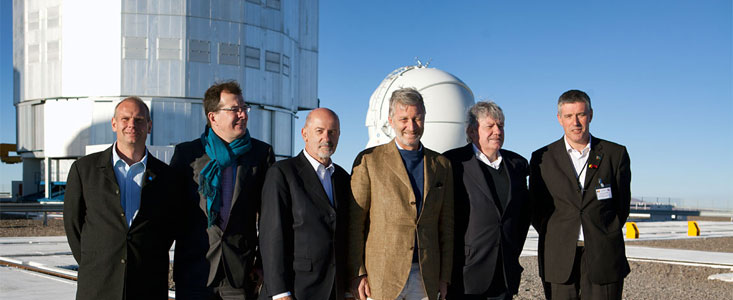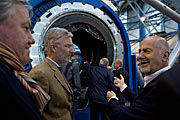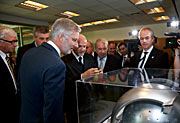Pressemitteilung
Prinz Philippe von Belgien leitet Wirtschaftsdelegation bei Besuch der ESO-Einrichtungen in Chile
8. Dezember 2011
Der belgische Thronfolger hat in Begleitung einer Delegation von Wirtschaftsvertretern das Paranal-Observatorium der ESO besucht, um zukünftige Beteiligungen der europäischen Industrie am European Extremely Large Telescope-Projekt der ESO auszuloten.
Seine Königliche Hoheit Prinz Philippe, Herzog von Brabant und Prinz von Belgien, begann seinen Besuch der chilenischen ESO-Einrichtungen am Montag dem 5. Dezember 2011 mit der Teilnahme am Industrie-Informationstag in der ESO-Geschäftsstelle in Vitacura, Santiago de Chile. Im Mittelpunkt der Veranstaltung standen die Möglichkeiten, die sich europäischen Firmen im Zusammenhang mit dem European Extremely Large Telescope (E-ELT) der ESO bieten. Das E-ELT mit seinem 40 Meter durchmessenden Hauptspiegel wird das größte optische Teleskop der Welt werden.
“Das E-ELT wird sowohl Firmen als auch Organisationen aus den ESO-Mitgliedsländern einzigartige Möglichkeiten eröffnen. Es wird das größte Teleskop seiner Art werden und die zukünftige Forschung maßgeblich mitbestimmen”, erläutert Prof. Massimo Tarenghi, der Abgesandte der ESO in Chile.
>Als Gründungsmitglied hat Belgien bereits eine Vielzahl wichtiger Beiträge zu ESO-Projekten geliefert. Dazu zählen unter anderem die vier Hilfsteleskope am Paranal-Observatorium, die von der belgischen Firma AMOS in Liège gebaut wurden. Außerdem sind bereits im Rahmen der Designphase des E-ELT zwei wichtige Aufträge an belgische Firmen vergeben worden.
Umgekehrt nutzen belgische Astronomen die Einrichtungen der ESO höchst intensiv. Erst kürzlich wurde mit dem belgischen TRAPPIST-Teleskop am La Silla Observatorium der ESO eine wichtige Entdeckung betreffend den Zwergplaneten Eris gemacht (eso1142).
Am Mittwoch, dem 7. Dezember, flog die Delegation von Santiago in die Atacamawüste, an einen der trockensten Plätze auf der Erde und Standort des Paranal-Observatoriums der ESO. Prof. Massimo Tarenghi sowie Dr. Michael Sterzik, der den Zweck und die Bedienung der Teleskope erläuterte, führten Seine Königliche Hoheit durch die Anlage. Im Anschluss an das Öffnen der Kuppeln bei Sonnenuntergang begab sich die Delegation in den Kontrollraum, um einen Eindruck von der wissenschaftlichen Arbeit auf dem Paranal zu gewinnen.
>Prinz Philippe wurde begleitet von Jean-Claude Marcourt, dem stellvertretenden Ministerpräsidenten und Minister für Wirtschaft und Außenhandel und neue Technologien der wallonischen Regierung, sowie von Staatsminister Jos Chabert, von dem belgischen Botschafter in Chile, Dirk Van Eeckhout, sowie von einer Delegation von Wirtschaftsvertretern mit Repräsentanten unter anderem der Firmen AMOS, SEPTENTRIO, ENE und XENIC sowie der Université de Liège.
Weitere Informationen
Die Europäische Südsternwarte ESO (European Southern Observatory) ist die führende europäische Organisation für astronomische Forschung und das wissenschaftlich produktivste Observatorium der Welt. Getragen wird die Organisation durch ihre 15 Mitgliedsländer: Belgien, Brasilien, Dänemark, Deutschland, Finnland, Frankreich, Italien, die Niederlande, Österreich, Portugal, Spanien, Schweden, die Schweiz, die Tschechische Republik und das Vereinigte Königreich. Die ESO ermöglicht astronomische Spitzenforschung, indem sie leistungsfähige bodengebundene Teleskope entwirft, konstruiert und betreibt. Auch bei der Förderung internationaler Zusammenarbeit auf dem Gebiet der Astronomie spielt die Organisation eine maßgebliche Rolle. Die ESO betreibt drei weltweit einzigartige Beobachtungsstandorte in Nordchile: La Silla, Paranal und Chajnantor. Auf dem Paranal betreibt die ESO mit dem Very Large Telescope (VLT) das weltweit leistungsfähigste Observatorium für Beobachtungen im Bereich des sichtbaren Lichts und zwei Teleskope für Himmelsdurchmusterungen: VISTA, das größte Durchmusterungsteleskop der Welt, arbeitet im Infraroten, während das VLT Survey Telescope (VST) für Himmelsdurchmusterungen ausschließlich im sichtbaren Licht konzipiert ist. Die ESO ist der europäische Partner für den Aufbau des Antennenfelds ALMA, das größte astronomische Projekt überhaupt. Derzeit entwickelt die ESO ein Großteleskop der 40-Meter-Klasse für Beobachtungen im Bereich des sichtbaren und Infrarotlichts, das einmal das größte optische Teleskop der Welt werden wird, das European Extremely Large Telescope (E-ELT).
Die Übersetzungen von englischsprachigen ESO-Pressemitteilungen sind ein Service des ESO Science Outreach Network (ESON), eines internationalen Netzwerks für astronomische Öffentlichkeitsarbeit, in dem Wissenschaftler und Wissenschaftskommunikatoren aus allen ESO-Mitgliedsstaaten (und einigen weiteren Ländern) vertreten sind. Deutscher Knoten des Netzwerks ist das Haus der Astronomie in Heidelberg.
Links
Kontaktinformationen
Massimo Tarenghi
ESO Representative in Chile
Santiago, Chile
Tel: +56 2 463 3143
E-Mail: mtarengh@eso.org
Patrick Geeraert
ESO Head of Administration
Garching bei München, Germany
Tel: +49 89 3200 6873
Mobil: +49 176 1300 6504
E-Mail: pgeeraer@eso.org
Gonzalo Argandoña
ESO education and Public Outreach Department
Santiago, Chile
Tel: +56 2 463 3258
Mobil: +56 9 9 829 4202
E-Mail: gargando@eso.org
Richard Hook
ESO, La Silla, Paranal, E-ELT & Survey Telescopes Press Officer
Garching bei München, Germany
Tel: +49 89 3200 6655
Mobil: +49 151 1537 3591
E-Mail: rhook@eso.org
Peter Habison (press contact Österreich)
ESO Science Outreach Network
and stem & mint e.U. – Space and Science Communications
Vienna, Austria
Tel: +43 676 648 7003
Email: eson-austria@eso.org
Über die Pressemitteilung
| Pressemitteilung Nr.: | eso1149de-at |
| Name: | Paranal, Santiago, Site visit, Very Large Telescope |
| Typ: | Unspecified : People : Other/General |
| Facility: | Very Large Telescope |




